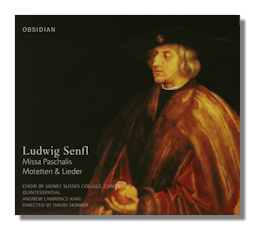
The Internet's Premier Classical Music Source
Related Links
- Latest Reviews
- More Reviews
-
By Composer
-
Collections
DVD & Blu-ray
Books
Concert Reviews
Articles/Interviews
Software
Audio
Search Amazon
Recommended Links
Site News
 CD Review
CD Review
Ludwig Senfl

- Missa Paschalis
- So ich sie dann
- Carmen in Re
- In Maien
- Ach Elslein
- Ich stuend
- Wohl auf
- Ave Maria (super Josquin)
- Was wird es doch
- Carmen in La
- So man lang macht
- Fortuna ad voces musicalis
- Quis dabit oculis (attrib. Senfl)
Andrew Lawrence-King, harp
QuintEssential Sackbut & Cornett Ensemble
Choir of Sidney Sussex College, Cambridge/David Skinner
Obsidian CD704
Actually recorded partly in Regensburg in Bavaria but by British musicians, this is a desirable collection of sacred and secular music by the Swiss composer, Ludwig Senfl, on the up-and-coming British label, Obsidian. Of immediate interest to lovers of Renaissance choral music, it has an innate appeal far beyond the fact that Senfl has rather unfairly been confined to minor status.
We believe that he was born in Basel around 1490 (probably in 1486), which puts him in the same generation as Janequin, Gombert, Dürer and Martin Luther, of whom Senfl was a favorite, apparently. His short career (he died in his early fifties, in 1543) began in the service of Holy Roman Emperor, Maximilian I. At his court he came under the influence of Heinrich Isaac, with whose composition of Choralis Constantinusit is now thought Senfl actually collaborated, and whose post he took in 1514 when the former retired to Florence. Ten years or so later Senfl was writing and performing at the court of Willhelm IV in Munich. It was this period that saw the composer's greatest motets. He will have come under several influences during these years there – and under the patronage of Duke Albrecht of Prussia.
But Senfl's music is not in any way derivative. It is beautiful, gentle, reserved and highly confident; majestic, almost, without either pomp or (undue) grandeur. Although at times some passages might remind you of the Italianate color of the Gabrielis from the next generation. There is a sensitivity and delicacy that falls very pleasantly on the ear… listen to the unhurried and gracious lines of Ich stuend an eminem Morgen[tr.9], for example: the sparseness of the texture is matched by the simplicity of the melody. This is one of several pieces which also feature the gothic harp of Andrew Lawrence-King in the stead of the cornetts and sackbuts of Quintessential, a British group formed in 1993 and gaining quite a following on the "early" music scene in Europe.
Other soloists responsible for a positive impact on the music-making on this excellent CD are tenor, Christopher Watson, and bass, Robert Macdonald. Their unobtrusive mixture of gentleness and authority seems to convey the spirit in which Senfl may well have wanted his music to have been received. The choir itself (some two dozen strong and with altos predominating) is convincing through their own nicely blended restraint and control.
The order of works presented here also adds to one's enjoyment: the Mass is divided into two sections of two tracks (1,2 and 6,7): there is no "Credo". The movements may even have originally come from two separate masses – for Advent and Easter. The others are motets and songs such that there is constant variety. Not that this is imposed: it is believed that it was common practice at the time to alternate forms and formats in performance.
An aim of the CD (there are but three others in the catalog devoted exclusively to Senfl's work) is to highlight his proficiency and adroitness in these several genres. That he has as much imaginative competence in the sacred, the devotional and the secular (songs of lost and unfulfilled love, for example – although In Maien [tr.5] has markedly more… "body", shall we say!) is very striking. Skinner and his forces have obviously thought long and hard about what these forms have in common for Senfl and where they differ. And then approached the performance in ways that bring out the essence of Senfl very successfully. Rights to assign parts of most of the pieces here to solo voices, instruments or the chorus have been judiciously exercised – for example one of the inner voices in the Ave Maria [tr.11] is taken by a shawm.
So here's a very attractive hour plus' music which may for some start by conjuring the feeling of imperial courts in central Europe from the Reformation (it's never clear just what Senfl's doctrinal stance was). But even greater satisfaction will come from getting still further inside the music, letting Senfl's gift for matching sound to text permeate your senses, and thus enjoying the sheer creative beauty of those sounds.
The accompanying booklet is printed in pale yellow on brown and extremely difficult to read – a practice which Obsidian would do well to abandon with their very next release. It contains useful essays, background and sketches of the performers as well as the texts in German or Latin and English. The recording is clear and atmospheric without undue resonance. All in all, a most welcome addition to the catalog.
Copyright © 2009, Mark Sealey





















